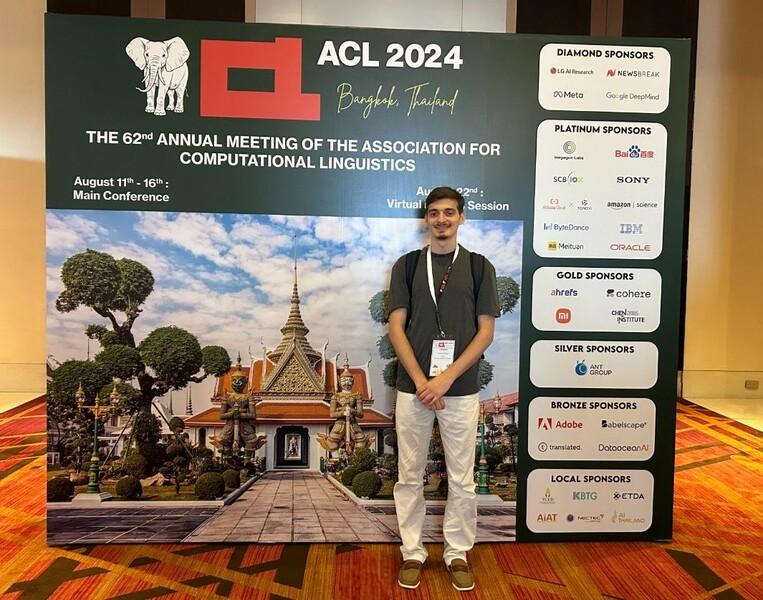- About
- Admissions
- Study at AUS
- Prospective Students
- Bachelor's Degrees
- Master's Degrees
- Doctoral Degrees
- Admission Publications
- International Students
- Contact Admissions
- Grants and Scholarships
- Sponsorship Liaison Services
- Testing Center
- New Student Guide
- File Completion
- New Student Orientation
- Payment Guide
- Executive Education
- Students with Disabilities
- Academics
- Life at AUS
- Research
- Contact Us
- Apply Now
- .

AUS grant fuels Kabbani’s Arabic language research at prestigious ACL Conference
For MHD Tameem Kabbani, his time at American University of Sharjah (AUS) was about more than just lectures and exams. His journey led him to the prestigious Association for Computational Linguistics (ACL) 2024 conference, where he presented his research on Arabic diacritization and natural language processing, thanks to a one-time grant from the AUS College of Engineering.
Graduating in June 2024 with a degree in computer science, Kabbani’s participation in the ACL conference marked a major milestone in his academic career. The ACL, held annually, is one of the most competitive forums in the field of natural language processing and computational linguistics, with an acceptance rate of only around 20 percent.
“Presenting at ACL wasn’t just an academic achievement for me; it was a personal milestone. I had the chance to meet and discuss ideas with experts from Stanford University and Massachusetts Institute of Technology—people whose work I’ve admired for years,” said Kabbani.
His passion for computational linguistics, particularly Arabic language technology, had been growing throughout his time at AUS. In addition to his academic work, Kabbani served as President of the Arabic Heritage Club in 2023, an experience that deepened his cultural connection while refining his leadership skills. “Being part of the club allowed me to celebrate my heritage, but also to think about how technology can preserve it for future generations,” he reflected.
The research Kabbani presented, titled “Arabic Diacritics in the Wild: Exploiting Opportunities for Improved Diacritization,” tackled a critical issue affecting millions of Arabic speakers—making the written language more accessible in a digital world. Collaborating with New York University Abu Dhabi and the Mohamed bin Zayed University of Artificial Intelligence, Kabban’s project aimed to improve how diacritics are applied to Arabic text. Diacritization, the addition of small marks to indicate vowels and pronunciation, is crucial for clarifying meaning and improving readability, especially for learners.
His presentation at the conference garnered significant attention, showcasing the importance of both machine learning and rule-based approaches to Arabic text readability. “Our project aims to improve the application of Arabic diacritics, which is essential for proper pronunciation and understanding, especially in digital contexts,” Kabbani explained.
The conference experience opened new doors for Kabbani, paving the way for future collaborations and establishing his place within the computational linguistics community. Currently, he is a Research Assistant Intern at Qatar Computing Research Institute, where he continues to explore the fast-evolving world of language technology.
Looking ahead, Kabbani is eager to push the boundaries of Arabic language technologies. “Whether as a research assistant or software engineer, I want to contribute to making language technology more inclusive, especially for Arabic speakers,” he said.
Kabbani’s story is just one example of how AUS empowers its students and alumni to reach their full potential. Through strong academic programs, dedicated mentorship and a commitment to supporting innovative research, AUS continues to cultivate leaders who are making an impact on the global stage.
To learn more about the AUS College of Engineering, visit www.aus.edu/cen.

